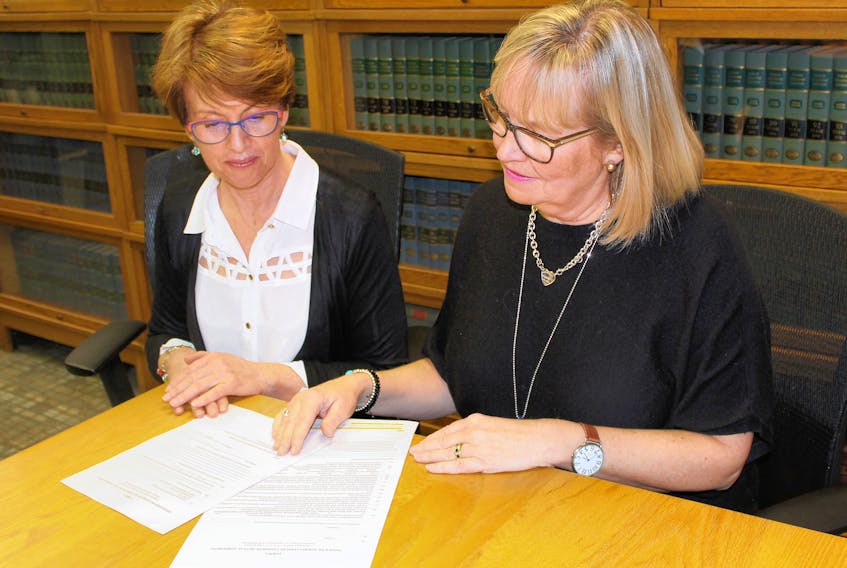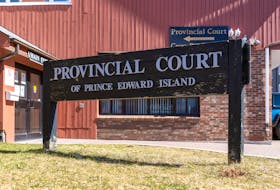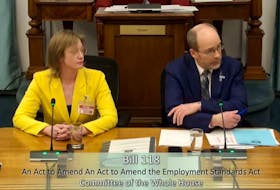CHARLOTTETOWN, P.E.I. — As the province’s capital continues to face a housing shortage, an organization that provides free legal information in Charlottetown has seen an increase in the number of tenant inquiries during the past several years.
Ellen Mullally, executive director of the Community Legal Information Association of P.E.I. (CLIA), said inquiries from renters have gone up by 10 per cent since last year.
“We had 83 landlord/tenant inquiries last year and 92 so far this year,” she said, referring to their fiscal year, which ends March 31, 2019.
While the association hears from both tenants and landlords, most of the inquiries are from tenants.
“There is definitely an upward trend over the last five years,” Mullally said, adding that during 2014-15, CLIA received 54 inquiries.

Rent increases exceeding the allowable limit, landlords evicting people for family or renovations without either occurring, and people getting evicted because their units are being changed to AirBnB are among the issues the non-profit has been hearing about.
“It’s really a volume increase,” said Mullally. “The issues haven’t changed, there’s just more people complaining.”
In an email to The Guardian, Kim Devine, senior communication officer with the Island Regulatory and Appeals Commission (IRAC), said if a landlord wants to increase rent by more than the allowable amount, he or she requires permission from the commission and must provide detailed information to justify additional increases.
“We have seen an increase this year in applications by landlords for a greater than allowable rent increase,” Devine said.
In order to increase rent, a landlord must give the tenant three months’ written notice on a form from IRAC (in the case of a weekly agreement, at least three weeks before the date on which it is to take effect), raise it by the allowable amount set by IRAC each year in September, and wait until at least 12 months have passed since the last rent increase for that particular apartment.
IRAC’s allowable rent increases for 2019:
- Furnace oil or other petroleum source heated premises: two per cent
- Electric heated premises: 1.75 per cent
- Unheated premises: 1.5 per cent
- Mobile home site located in a mobile home park: 1.5 per cent
Source: IRAC website
Rent increases work the same way regardless of whether a tenant is in a month-to-month agreement or a fixed-term agreement and shall not be increased until 12 months have elapsed since the date of any previous increase. In the case of residential premises not previously rented, it can’t be raised until 12 months from the date on which rent was first charged.
Devine said it’s important to note rent runs with the unit, not the tenant.
“So, even if a tenant moves out after three months, the landlord cannot increase the rent until 12 months has passed since the date of the last increase.”
When it comes to renovation evictions, Devine said if a tenant receives a notice of termination they want to contest, they may file an application with IRAC within 10 days of receiving it and a hearing will be held.
“To be successful, a landlord must establish that they are conducting extensive renovations to the unit that cannot be carried out while the tenant is living in the unit,” wrote Devine. “The standard in our legislation is good faith.”
Devine said the majority of the last 10 hearings on this issue have been denied and the landlords were not allowed to evict based on renovations.
Nature of inquiries Community Legal Information Association of P.E.I. has received:
- Rent increases between tenants that exceed the allowable limit;
- Landlords evicting people for family or renovations and neither actually occur;
- People being evicted because their unit is being changed to AirBnB;
- People needing basic repairs (heat, water) that do not get done;
- People being told they cannot rent in a building because they have children (against the law under the Human Rights Act);
- Landlords refusing to deal with troublesome tenants (ie: multiple complaints by other tenants for smoking by doors, etc.)
Number of inquiries CLIA has received over last five years:
- This year to date: 92 inquiries re landlord/tenant issues
- 2017-2018: 83
- 2016-2017: 84
- 2015-2016: 71
- 2014-2015: 54
IRAC received 6,856 inquiries during the fiscal year 2017-18, many of which were phone calls from people requesting information and no other action was required.
There were 479 formal disputes filed. Of those, 39 were withdrawn before any action was taken and 48 were resolved by mediation.
“Most of the disputes are about a breach of statutory conditions which can be related to waste management, rent, late penalty payment, quiet enjoyment of property, entry doors, sublets, services, rental agreement and condition of premises,” wrote Devine.
Of the 328 orders issued by the director of rentals, 26 were appealed to the commission.









